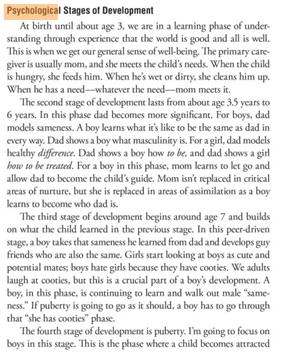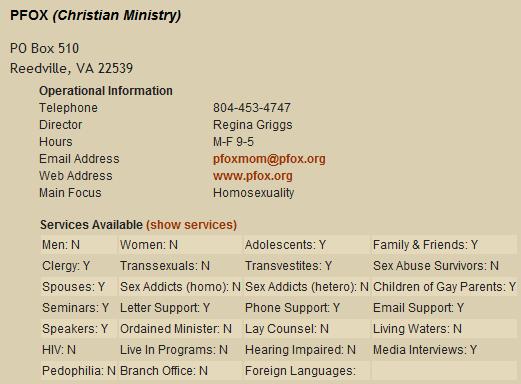On other threads, we have discussed why reparative therapy vignettes and ex-gay testimonies are so often alike. I have suggested that there are different causal pathways which lead to different sexual orientation outcomes. Also, therapists like Joe Nicolosi and Richard Cohen have strong public positions which promote a particular causal narrative. Clients who may have histories in line with those narratives seek counseling from those therapists. The same dynamic likely occurs in Exodus ministries where unhappy people seek help based on reading or hearing public testimonies.
People seeking help for unhappiness might be more likely to have life circumstances which they view as causal. Therapists looking for such causes ask questions which validate the hunches. It seems easy enough to imagine how therapists and clients can arrive at a common narrative without even trying to do so.
Same-sex attracted people who have not been traumatized in some way often react with puzzlement and frustration when, like palm readers, therapists go through a litany of questions about non-existent past trauma, seeking some confirmation of the predicted narrative. Eventually small, forgotten hurts and deprivations are identified as evidence for the expected patterns.
While I believe this occurs often, I have no idea how often. I also am pretty sure that the histories of some people are relevant to their sexual attractions. The research on the variability of pathways to sexual orientation is sparse but there is some and it demonstrates that on average same-sex attracted people who seek help of some kind (therapy or Exodus) recall more troubling relationships with parents than same-sex attracted people who have not sought therapy or ministry help.
The primary reference in this regard is Bell, Weinberg & Hammersmith (1981) Sexual preference: Its development in men and women. Bloomington: Indiana University Press. An important section on the differences between clinical and nonclinical groups is reprinted here from pages 202-203.
Homosexuals in Therapy
More than half of the WHMs [white homosexual males] (58%) said that at one time or another they had sought help for a personal or emotional problem from a professional counselor such as a psychiatrist or a psychologist. Most previous studies of the development of male homosexuality have been based on the reports of homosexuals “in treatment,” and many scholars have tried to generalize their findings to other homosexuals as well. When our own findings failed to support so many widely held clinical views, we were curious to see whether the reports of respondents who had been in therapy would differ from those made by respondents who had never sought professional counseling or therapy.
What we found was that those respondents “ever in treatment” did indeed have the kinds of paternal variables in their model that were consistent with what clinicians have always thought to be typical of homosexual males. The path model of those “never in treatment,” on the other hand, either did not contain such variables or showed their influence to be weaker. For example, as the literature suggests, the “therapy” group tended to have Detached-Hostile Father (t.e.= .29), a variable that is tied to the son’s gender nonconformity and early homosexual experiences. This variable does not even appear in the model for the men who have never been in therapy, however. Moreover, although the “nontherapy” group had more Negative Relationships with their Fathers, this variable (t.e.= .11) did not influence their gender nonconformity at all. In addition, two other variables that were important for the therapy group — Cold father and Negative Image of Father — do not appear at all for the nontherapy males. Although the rest of the path model is much the same for both groups, clearly the model for the therapy group corresponds much more closely to the way fathers have been considered in theories about the etiology of male homosexuality.
How might this discrepancy be explained? On the one hand, it could be supposed that cold, detached fathers make for troubled sons who are likely to seek psychological treatment at some point in their lives. Likewise, it could be argued that “therapy” often involves an “education” of client by the therapist in which the client comes to believe what the therapist supposes must be true of the client’s parents. Alternatively, it could also be argued that fathers tend to withdraw (become detached) from psychologically troubled sons, who are later to seek psychological counseling.
Whatever the case may be, at least on the basis of what our respondents could remember about their parents, Cold or Detached-Hostile Fathers cannot be regarded as important in the development of male homosexuality in general, since their alleged influence does not even appear among those who neve sought therapy or counseling. Finally, it should be noted that the differences between the therapy and non-therapy groups do not stem from differences between these two groups in terms of effeminacy or bisexuality. We found no significant correlations between being exclusively homosexual and having been in therapy, the more effeminate WHMs were only somewhat more likely than the non-effeminate WHMs ever to have been in therapy (64% versus 54%).
Bell et al, also compared WHMs and WHTMs (white, heterosexual males) who had and had not been in therapy. The findings regarding these comparisons are not drawn out in the same manner as above. However, there is a footnote on page 202 briefly describing the analysis.
The path analysis on which these findings were based included all the white heterosexual males, whether or not they had been “in treatment.” Separate analyses, one comparing only those WHMs and WHTMs “ever in treatment” and and one comparing those WHMs and WHTMs “never in treatment” replicated the results reported above.
For women, the picture was somewhat different. The authors noted that 2/3rds of the WHW had been in therapy and then on page 209, they wrote:
We do find some differences between the path model for the women who had been in therapy and those who had not. Notably, Childhood Gender Nonconformity appears to have been a more important factor for the respondents who had been in therapy or counseling (t.e.= .71 versus .52 for the women who had never been in therapy or counseling.)
In addition, the path model for the homosexual women who had in therapy or counseling includes two variables pertaining to a sense of estrangement or unhappiness while they were growing up: Unhappiness in Adolescence (B=.14) and Felt Different from Other Girls in High School (B=.11). The path model for the nontherapy group contains no comparable measures.
Finally the path model for the women who had been in therapy or counseling includes two variables pertaining to an unhappy recollection of the mothers: Negative Relationship with Mothers (t.e. = .24) and Unpleasant Mother (t.e. = .22). The nontherapy group on the other hand, appear to have been slightly more influenced by their fathers. Their path shows significant — but weak — paths from Weak Father (t.e. = .20), Aloof Father (t.e. = .14), Controlling Father (t.e. = -.10), and Mother Dominated Father (t.e. = .14). Otherwise, the differences between the women in therapy or counseling and those with no such experience show little pattern.
In the path analysis procedure used in Bell et al’s research, the “t.e.” you see repeated throughout this passage refers to the “total effect” of one variable on another, in this case sexual preference. Think of it as a measure of the strength of effect of each variable mentioned and sexual orientation, with the larger numbers representing a larger effect. While there are many points we could discuss here, the primary reason for this series is to examine the possibility that multiple paths exist which yield the direction of sexual attractions. A practical implication is that therapists who frequently counsel those who are seeking help probably get a skewed picture of same-sex attracted people in general. Another implication is the effects noted by the reparative drive theorists are not huge and must rely on other pre- and post-natal factors. Also, those who take a solely biological perspective should expand the complexity of their model to consider that the sexual behavior of some people are influenced by certain environment experiences.
The next posts in this series will include additional research as well as more results from Bell et al. Some research does find differences between gay and straight groups on developmental recollections. What do these differences mean? Stay tuned…

